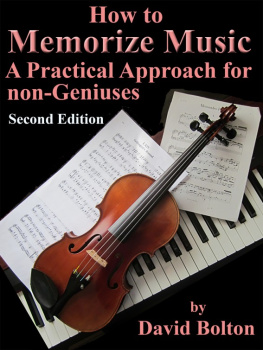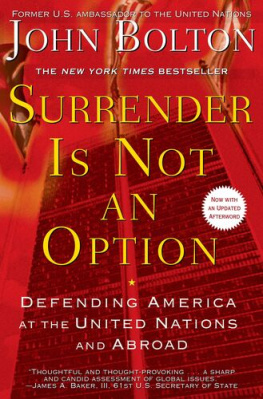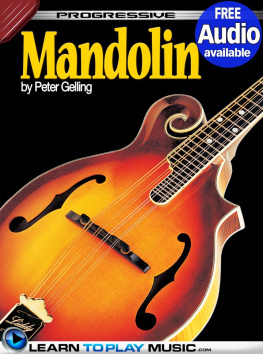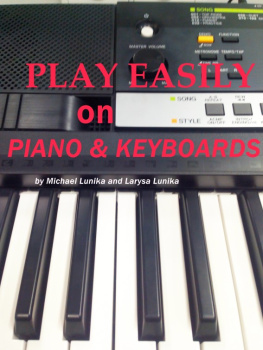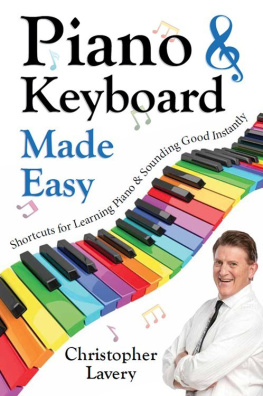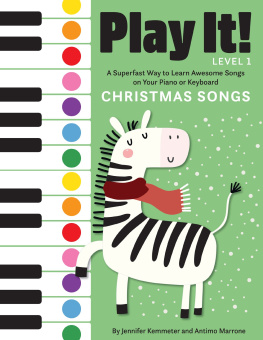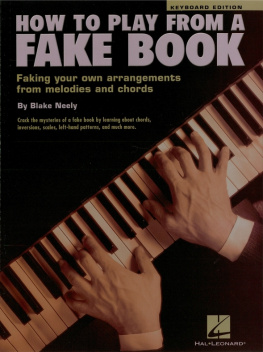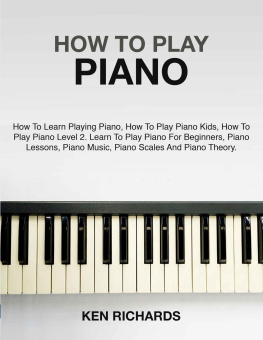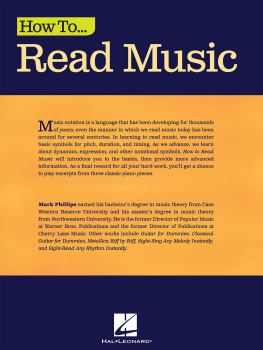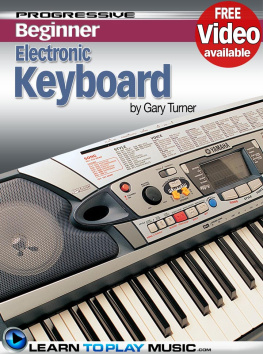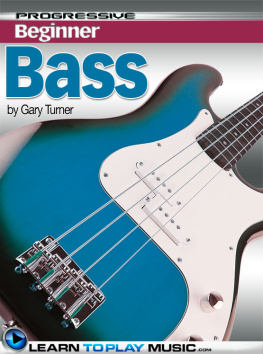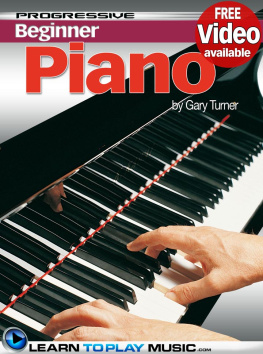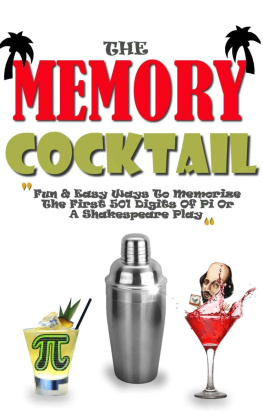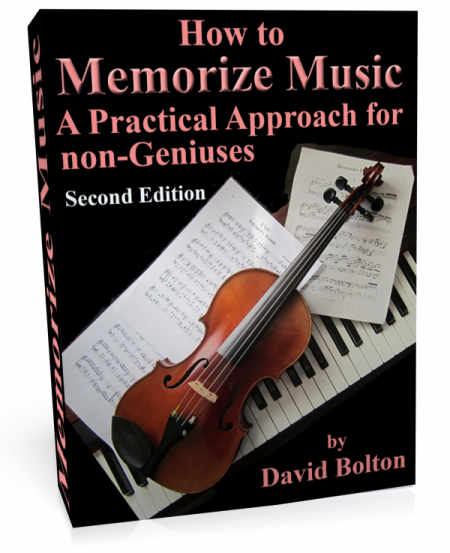
How to Memorize Music APractical Approach for Non-Geniuses
by
David Bolton
SMASHWORDS EDITION
* * * * *
PUBLISHED BY:
David Bolton on Smashwords
How to Memorize Music A PracticalApproach for Non-Geniuses
Second Edition
Copyright 2015 by DavidBolton
See all of my books and download some thatare free at mysite:
www.dboltoncreations.com
Smashwords Edition LicenseNotes
This eBook is licensed for yourpersonal enjoyment only. This eBook may not be re-sold or givenaway to other people. If you would like to share this book withanother person, please purchase an additional copy for each personyou share it with. If you're reading this book and did not purchaseit, or it was not purchased for your use only, then you shouldreturn to Smashwords.com and purchase your own copy. Thank you forrespecting the author's work.
* * * * *
Dedicated to Maki, in lovinggratitude
How to Memorize Music APractical Approach for Non-Geniuses
Table of Contents
(new to secondedition)
***
Introduction
Imagine that you are not at home, andyou come across a piano, or other type of keyboard. Maybe you areat a friends house, in a music shop, at a school, orwherever.
How wonderful it is to be able to sitdown in front of it, and begin to play a piece that you know andlove by memory, without the aid of the printed score, and with fullconfidence that you will play the piece well, for the sake of thosewho may be listening, as well as for that of your ownpride!
Or perhaps you play the violin, andwish to be able to more quickly and effectively commit entirepieces to memory, in order to master them morethoroughly.
If the guitar is your instrument, youprobably can get by without a score anyway, at least for simplerpieces, possibly those of your own invention. Nonetheless, if youplay classical guitar, you may well wish to learn more complicatedpieces, such as those that Bach wrote for lute, and knowing suchworks by heart can bring you a big step closer to theirmastery.
No matter which instrument you callyour own, it is always desirable to be able to play at least a fewpieces by memory, since a piece that you have thoroughly memorizedhas truly become a part of you. In addition, not having to look atthe score leaves your mind that much freer to concentrate onimproving the essentials of your interpretation: correct phrasing,articulation, the proper tempo; in general, the development of acoherent, stylistically accurate interpretation of thework.
If you are a musical genius, you mightwonder at the difficulties that most of us normal mortals havewhen it comes to memorizing a piece of music. Occasionally, we readabout great pianists, for instance, whose ability to absorb awork is truly astounding.
- Vladimir Ashkenazy, a famous pianistgifted with a photographic memory, once said that all he needs todo is look over the score of a composition, no matter howtechnically difficult it may be. By simply reading the score, hecan make a mental photograph of what is on the page, and the nextday, he can play it in a recital.
- Josef Hofmann, the great Polishpianist, was able to simply listen to a piece being played, afterwhich he himself was able to play it flawlessly. Compared withother famous pianists, it is said that Hoffman was not a goodsight-reader, but then, he really didnt have to be. He learned notby sight, but by hearing, and was able to take in entire workssimply by listening to them.
I know some musicians who would selltheir souls to the devil or to whomever else might be interested in order to acquire such abilities as those of Ashkenazy orHofmann!
Unfortunately, most of us who play aninstrument will never be able to learn new music with suchfacility, and are therefore obliged to resort to hard work (ifyoull forgive the expression!) in order to commit the pieces weare learning to memory.
This book has not been written for yougeniuses out there, for you will not need it. Rather, it is forthat great majority of musicians who are not geniuses, but who areseeking ways to make the memorization of music easier, faster, andmore effective.
Some of what you read here may not benovel; bear with me in those sections. Other ideas, though, maywell be new to you. In any case, if you follow the advice given,you will be able to take a lot of the struggle out ofmemorization, and there is even a chance that you may start to findthat the whole process of committing a piece to heart can indeednot only become pleasantly controllable and plan-able, but alsoquite a bit of fun!
That point should not be takenlightly, for the more fun you have doing something, the more youwill want to dedicate yourself to it. In this case, that willtranslate into you having a growing number of pieces at yourcommand, pieces that will remain in your memory, and that will thenbe able to take on new life and depth thanks to the fact that theyare now truly a part of you.
The main focus of this book will be onkeyboard pieces, yet musicians who play other instruments will alsobe able to profit by the advice given herein. Piano pieces are farmore complicated, and thus harder to learn by memory, than thosewritten for the violin, cello, or wind instruments, for example.Although the piano, harpsichord, organ and other keyboardinstruments do not have the single-note expressive power of theviolin, for instance, they do have one great advantage: the playeris not restricted to playing just one or two notes at the sametime, but may play the fullest chords, so that it is possible toperform even symphonic works with two hands at the piano (assumingone has a transcription/reduction for the piano, so that the scoreis more easily readable for the pianist).
Violinists, and many othernon-keyboard players, will be able to use the techniques given inthis book all the more rapidly, since memorizing a single voice isnaturally much simpler than learning a work with many simultaneousvoices, or one laden with full chords.
Yet though this work may be profitablyread by anyone who plays a musical instrument, I have chosen towrite it mainly with keyboard players in mind. Note that I do notsay here pianists, but rather use the broader term keyboardplayers, or keyboardists, for this term includes pianists,harpsichordists, clavichordists, organists, and the millions ofpeople who own, and play, digital keyboards of various sizes,keyboard ranges, and sound sets.
The examples given will be taken fromkeyboard works; those of you who play different types ofinstruments should not have any trouble at all applying the adviceto the specific pieces of music composed for your instrument, andwhich you would like to memorize.
T hree basic types ofmusic memorization
1) Learning by hearing . The mostnatural way to memorize music would be to hear it, and to repeatwhat you hear at your instrument. Some of you may already be doingthis, at least for simpler pieces, though in my experience, I haveseen that most people who study classical keyboard (piano, organ,harpsichord, clavichord) do not memorize this way, no doubt due tothe fact that the works they generally study Bach fugues,Beethoven sonatas, Chopin etudes, and the like are extremelydifficult to simply hear and then play, for they contain a myriadof complex figures, advanced harmonies, and multi-linetextures.
In addition, classical keyboardistsusually begin their studies using scores - those first volumes thatstart off with tiny pieces made up by the writer of the Method,and that usually end with those little Bach minuets that well-nigheveryone who has ever taken piano lessons has played during thefirst or second year of keyboard study.
Next page
